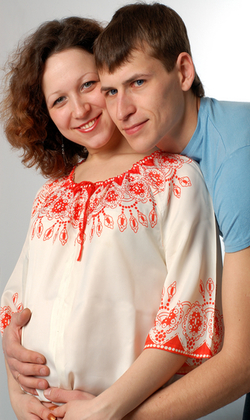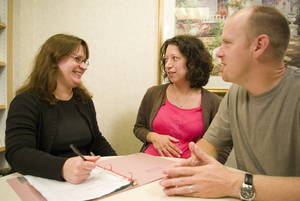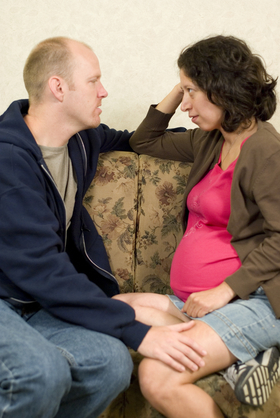How Can I Arrange the Best Birth Support?

If you are interested in having a holistic childbirth, you will want to choose a midwife or doctor who understands and supports this, and encourages your active participation in making decisions and choices. (This can be challenging if your insurance coverage or the area where you live limits your choices.)
What are my provider choices?
 If you live in the United States, your choices for pregnancy and birth care providers are outlined below (in alphabetical order). In other countries, practice credentials might vary somewhat. In many countries, midwives provide care for almost all low-risk pregnant people, with obstetricians caring for pregnant people with risk factors.
If you live in the United States, your choices for pregnancy and birth care providers are outlined below (in alphabetical order). In other countries, practice credentials might vary somewhat. In many countries, midwives provide care for almost all low-risk pregnant people, with obstetricians caring for pregnant people with risk factors.
- Certified Nurse-Midwife (CNM). CNMs are registered nurses who have completed an accredited program of midwifery, typically at the master's level, and who have passed a national certification exam. CNMs generally attend births in hospitals or birth centers, but some may have homebirth practices.
- Certified Midwife (CM). CMs are non-nurses who have completed an accredited program of midwifery, typically at the master's level, and who have passed the same national certification exam as CNMs. CMs are licensed to practice in some, but not all, states. CMs generally attend births in hospitals or birth centers, but some may have homebirth practices.
- Certified Professional Midwife (CPM). A CPM is a midwife who has completed an accredited midwifery program or an alternative educational program such as an apprenticeship approved by the North American Registry of Midwives, and has passed a national certification exam. Unlike CNMs, CPMs do not prescribe medication. Each state licenses or otherwise regulates the practice of CPMs differently, and there are some states in which CPMs may not legally attend births. Click for state requirements. CPMs generally attend births in homes or birth centers.
- Family Practice Physician (FP). FP physicians are medical doctors or doctors of osteopathy (DOs) who have completed medical school and a family medicine residency program. Physicians are licensed in all states. The Board Certification examination for FPs is optional and not a legal requirement of practice, although it may be required to work in most hospitals and practices. Not all FP physicians provide obstetric care. FP physicians generally attend births in hospitals. Very few attend homebirths.
- Noncertified midwife. Noncertified midwives may be known by several titles, including traditional midwives or lay midwives. Educational backgrounds might vary since there is no certification agency to verify educational requirements or accreditation. Each state regulates the practice of noncertified midwives differently, and there are some states where noncertified midwives may not legally attend births. Click for state requirements.
- Obstetrician (OB). OBs are medical doctors (MDs) or doctors of osteopathy (DOs) who have completed medical school and an obstetrics residency program. Physicians are licensed in all states. The Board Certification examination for OBs is optional and not a legal requirement of practice, although it may be required to work in most hospitals and practices. OBs generally attend births in hospitals or births centers. Very few attend homebirths.
How do I choose?
 You will want to research the provider's approach and philosophy. In some practices, you may be able to see the doctor or midwife you saw prenatally during your birth, in other practices, the doctor or midwife who is "on-call" will attend your birth. In this case, you will be attempting to determine the philosophy of the group, which can be difficult.
You will want to research the provider's approach and philosophy. In some practices, you may be able to see the doctor or midwife you saw prenatally during your birth, in other practices, the doctor or midwife who is "on-call" will attend your birth. In this case, you will be attempting to determine the philosophy of the group, which can be difficult.
The Coalition for Improving Maternity Services (CIMS) is a coalition representing more than 50 organizations involved in various aspects of the health of pregnant people and children. CIMS has written guidelines for recognizing "mother-friendly" birthplaces and providers, as well as outlined a set of questions that parents can consider when choosing a midwife, doctor, or birthplace.
Additionally, check out the activity Questions for your Midwife or Doctor that lists items to consider as you choose a provider.
What about the hospital?
Ask potential providers where they attend births. Providers are granted clinical privileges, which means they are given permission to work at hospitals and can only admit and care for patients at hospitals or birth centers where they hold privileges.
Questions to help choose a birthplace If you are planning a home birth, discuss how referrals might be made and where you would go if complications arose.
Investigate the potential hospitals or birth centers. Don't be attracted to the facility with the best wallpaper and artwork - you are interested in their support of a holistic approach to childbirth.
How can my family and/or friends help me?
 While only you can give birth to your baby, the support of those around you is very important.
While only you can give birth to your baby, the support of those around you is very important.
Your family and friends may provide physical assistance and emotional reassurance, or help you communicate with your midwife or doctor. Several studies have shown that women who have good support have faster labors, use less pain medication, and have a decreased chance of having a cesarean section.
So, it makes sense to choose your support person or people carefully. For many people, this will be their partner or husband, for others it might include other family members or friends, such as mothers, sisters, or friends. Each person included should be aware that they are there to provide support and help you, not just be a spectator, or to visit with each other.
Consider people whom you believe would do a good job of tuning in to your needs. If you have a good relationship with your mother or mother-in-law, their presence might be a wonderful addition at your birth, not only for the support they offer but for the opportunity to be present at the birth of their grandchild. However, if you have a troubled relationship with your mother or mother-in-law, having them at your birth might cause additional anxiety and should be avoided.
What do I need to talk about with my family or friends?
- Discuss your plans carefully with your partner. Identify each other's goals and expectations. Consider how your partner can best help you. Is your partner supportive of a holistic approach to childbirth? Do they understand the benefits? How do they feel about supporting you through pain? Can your partner help advocate for you with hospital staff, midwives, or physicians? If your partner has assisted you during birth before, or has other children, how did things go last time?
You might often see the word "coach" associated with birth partners, but this might not be the best description of what you need. A coach is someone who is considered an expert at an event, who provides you with instructions and encouragement. Your birth partners do not need to be experts (although some knowledge is useful), nor do they need to tell you what to do. Yet their role in physical and emotional encouragement is invaluable.
- Consider what help your partner needs. If your partner feels uncertain about providing assistance, discuss the possibility of finding a doula (see below) to assist as well.
- Discuss how decisions are made in your family. Some prospective parents make their healthcare decisions on their own, while others include their partner in their decisions. In some families and cultures, the partner is expected to play a larger role in decision-making. In other families, a family elder makes the final decisions. While there is no right or wrong way to do this, it is helpful to recognize how this process occurs in your family, and, if you will be receiving help in making your decisions, discuss your desires with those who will be involved.
If you include other family members or friends, do they support your plans for birth? What are their previous experiences of childbirth? Are they able to separate their experiences from yours? Ideally, friends or family members will be able to offer suggestions and physical and emotional support, drawing on any previous experiences, but recognizing that your experience will unfold differently.
How can a doula help?
Some parents-to-be might also choose to include a professional doula, a person who has been educated to support women and their families during childbirth. Female family members or friends historically filled this role for prospective parents, especially before childbirth moved into the hospital.
 When the shift to hospital first occurred, even a birth giving parent's husband was rarely allowed into the labor and delivery unit. Then the natural childbirth movement asserted the importance of support for laboring parents and was instrumental in getting a birth giving parent's partner into the room. In most hospital settings today, birth giving parents may have whomever they choose at their birth, and some people include their partners, family members or friends, and a professional doula to provide help and assistance.
When the shift to hospital first occurred, even a birth giving parent's husband was rarely allowed into the labor and delivery unit. Then the natural childbirth movement asserted the importance of support for laboring parents and was instrumental in getting a birth giving parent's partner into the room. In most hospital settings today, birth giving parents may have whomever they choose at their birth, and some people include their partners, family members or friends, and a professional doula to provide help and assistance.
In the United States, doulas may be certified through DONA International. While it might seem strange at first to include a person whom you do not know well in your birth, you will meet with your doula before birth and review your goals for birth with her. The doula will remain with you throughout your labor and birth, unlike labor nurses, midwives, or physicians who might care for more than one laboring woman at once or who might leave at the end of their shift.
Good doulas will provide support for your birth partner(s) as well, giving them tools and suggestions as they assist you. Doulas might also be known as monitrices, or simply as labor support professionals. More information about doulas, how to find one, and what questions to ask when considering a doula can be found at DONA's website.
Ginny and Carrie's Choices
Ginny
Ginny changed caregivers at 34 weeks. She had developed gestational diabetes, and after implementing exercise and diet changes, she also began to focus on stress reduction by spending time each evening listening to music and verbalizing the emotions she felt during the day. With these changes, she was able to keep her blood sugar levels in a normal range. She wanted to continue her pregnancy focusing on wellness, but she felt that her first provider was unable to look beyond her new "high risk" status.
Her provider noted that she was uncomfortable with some aspects of Ginny's wishes for her birth. So Ginny found a different obstetrician who was more comfortable integrating Ginny's focus on wellness despite her new diagnosis.
Carrie
Carrie, who had asked her sister Tina to be there at the birth, began to wonder how she would react to Tina's support during labor. She wondered if she might feel pressured to take Tina's suggestions, especially since she had been emotionally and financially dependent on Tina. She knew she wanted Tina there, more than anyone else, but she knew that Tina had strong ideas about how things should be done and considered herself somewhat of an expert since she had already had two babies. It took a great deal of courage, but Carrie brought up this topic with her sister. Tina was receptive, and acknowledged that it was often hard to give up the big sister role and see Carrie as an independent person. Together, they decided to find a doula as well, someone who could add a perspective other than Tina's and support them both through labor. Tina called the doula to join them after they arrived at the hospital.
Additional Reading
The Coalition for Improving Maternity Services (CIMS) is a coalition representing more than 50 organizations involved in various aspects of women's and children's health.
DONA, or Doulas of North America has information on what doulas do and how to find one.


